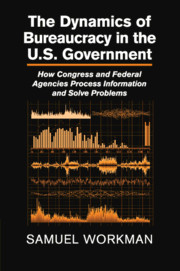 The Dynamics of Bureaucracy in the US Government
The Dynamics of Bureaucracy in the US Government Published online by Cambridge University Press: 05 May 2015
For democratic systems like the United States, the Elmore problem means that legitimacy and authority reside at the top of the governing system, whereas the expertise to monitor and define problems originates from below. Much has been written in scholarly disciplines and elsewhere about the problem posed by unelected officials who skirt the public will. But this is perhaps democracy's easier problem. After all, power resides with the people or their elected representatives by definition in a democracy. This power, sometimes ill informed and wielded awkwardly, brackets the ability of the larger governing system to address problems that are important to citizens and politicians alike. In fact, the argument laid out here takes congressional direction of the policy process as a given, as something so innate to the process of addressing problems and making policy that it occurs at the earliest stages of the process, even absent well-defined incentives or policy goals.
Although elections are often a handy redress for correcting wayward officials, they also sometimes act as an inefficiency on government information processing. Democratic systems are unparalleled in representing and aggregating preferences, but are far less adept at aggregating and synthesizing expertise. The system does respond to information, but slowly and/or sporadically. How does the system cope at the juncture of authority and expertise?
For the answer, we must examine the earliest stages of the policy process. At the point where the Elmore problem introduces tremendous stress on the system of government, the dual dynamics of congressional prioritization and bureaucratic problem solving create a two-way flow of information about the problems facing government. This two-way flow of information offers both members of Congress and bureaucrats an opportunity to influence the direction of public policy, even when they disagree on strategies for dealing with the problems.
FOUNDATIONS OF THE ARGUMENT
The conceptualization of information in the policy process lies at the core of the theory of dual dynamics. Information has three characteristics important for understanding the influence of bureaucracy in the policy process.
To save this book to your Kindle, first ensure [email protected] is added to your Approved Personal Document E-mail List under your Personal Document Settings on the Manage Your Content and Devices page of your Amazon account. Then enter the ‘name’ part of your Kindle email address below. Find out more about saving to your Kindle.
Note you can select to save to either the @free.kindle.com or @kindle.com variations. ‘@free.kindle.com’ emails are free but can only be saved to your device when it is connected to wi-fi. ‘@kindle.com’ emails can be delivered even when you are not connected to wi-fi, but note that service fees apply.
Find out more about the Kindle Personal Document Service.
To save content items to your account, please confirm that you agree to abide by our usage policies. If this is the first time you use this feature, you will be asked to authorise Cambridge Core to connect with your account. Find out more about saving content to Dropbox.
To save content items to your account, please confirm that you agree to abide by our usage policies. If this is the first time you use this feature, you will be asked to authorise Cambridge Core to connect with your account. Find out more about saving content to Google Drive.